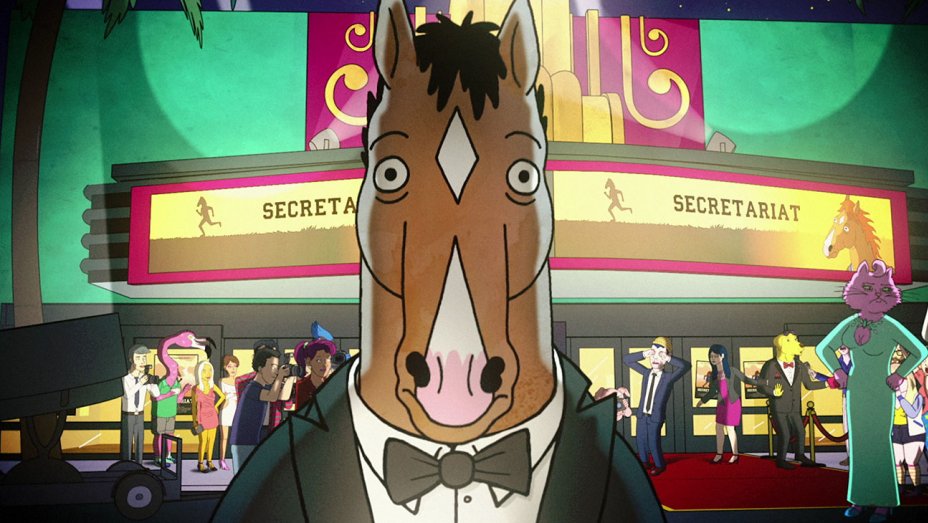'BoJack Horseman' Season 3: TV Review
Netflix's animated horse comedy keeps getting darker, sadder and funnier.
Netflix's BoJack Horseman evolved from frothy talking-animal Hollywood satire to character-rich treatise on depression in its first season, deepened and darkened into one of TV's best shows in its second season and gallops into its third season with a profound confidence. No longer needing to prove its commitment to imposing human frailties on the entertainment industry's animal kingdom, season three of BoJack Horseman finds creator Raphael Bob-Waksberg and artist Lisa Hanawalt experimenting with episode structure and storytelling and filling the screen with a quantity of inside jokes and background gags that caused my viewing to take twice the normal time as I kept pausing to scribble down things that made me laugh.
The title "Best Show on TV" is one that I like to bestow actively based on which series are and aren't currently on-air — and as of the Friday's premiere of 12 new episodes, it's possible that BoJack Horseman will hold the title, at least for a little while.
In a hilarious but disturbingly grounded way, BoJack Horseman is a show about consequences and self-flagellation, several interlocking sets of downward spirals that can't be arrested by success or romance or the things that might make healthier people feel conventionally happy. So if you thought that BoJack (Will Arnett) hit bottom after last season's tremendous "Escape From LA" episode, in which he came close to making a horrible decision with the daughter of the love of his life, or that the release of BoJack's long-gestating Secretariat film would be enough to raise his spirits his spirits for long, you don't know [Bo]Jack.
Indeed, the third season begins with BoJack on the junket circuit for Secretariat, repeatedly describing the project as a "dream come true," but meaning it less with each repetition. The season's main arc involves the endless pre-Oscars circuit and finds lots to mock about award-bait movies, film festivals, campaign publicists and the challenges of following up prestige projects. "An Oscar won't make you happy forever. It won't solve all your problems," BoJack is told, but in the short term, it's what's keeping him from dealing with what he did last season and if he ever starts dwelling on that, heaven help him.
Off to the side, but taking increasing prominence at times, Todd (Aaron Paul) and a friend from his past come up with a business idea that's brilliant until it isn't; Diane (Alison Brie) and Mr. Peanutbutter (Paul F. Tompkins) go through marriage counseling and make a tough personal decision; Princess Carolyn (Amy Sedaris) faces the challenges of running her own agency; and one character makes an aggressive investment in spaghetti strainers. New characters include a screenwriting hamster voiced by Jeffrey Wright, a food critic who's a worm, a whole fleet of stripping orcas and Jessica Biel.
Having seen the entire season, I'm keeping things vague, because one of the things Bob-Waksberg and the writing team pride themselves on is crafting a story in which plot details big and small pay off in ways that feel funny, absurd or heartbreaking by the end. Just as the first and second seasons had a very appreciable build, the third season has waves of misery and giddiness, satisfying "A-ha!" moments and at least one episode, credited to Bob-Waksberg as writer, that's just straight-up crushing. Even in our Netflix era of binge availability, it's still somewhat rare to have a full season of a show made available to critics, but in the case of BoJack, it reflects and allows critics to reflect on a unity of structure and vision.
But if the third season is one big orbital journey, it's also composed of many little epicycles of format tweaking that will probably impress, but not surprise, fans of a show that once dropped an unexpected holiday episode for its long-running show-within-a-show Horsin' Around. Important parts of this season are set in 2007 and focus on a key moment in BoJack's career and relationship with Princess Carolyn, and the trip back in time leads to several of the season's catchy original songs. The fourth episode, guaranteed to rank high on many lists of the season's best episodes, finds a delightful way to mostly eliminate dialogue. And the aforementioned annual episode of devastation plays with memory and perception in a way that's funny and relatable, but then gutting.
The best way to honor BoJack Horseman is to acknowledge and praise its sadness, to note how fueled it is by the hollow promises of celebrity and fame and how well-versed it is in the language of self-help and 12-step programs and quick-and-slow-fix solutions to unhappiness.
The best way to convince people who have been hesitant to sample BoJack Horseman because of not-unjustified trepidation about watching "that show about the talking horse" is to celebrate its intelligence and many-layered humor. The combination of Bob-Waksberg's often scathing take on Tinseltown and its hollow glamour and Hanawalt's gleeful and frequently goofy depictions of animal and animalistic behavior in an otherwise recognizable world is potent. With humans, a live-action version of BoJack would make Action or The Player look sunny and upbeat, but Hanawalt's art respects the cynicism and adds welcome silliness. And that's before you get to a vocal turn that I consider perhaps Arnett's best work and the fact that when I hear Paul's Mazda ads, I now yell "It's Todd!" at my screen rather than, "It's Jesse!" Oh, and Kristen Schaal and Character Actress Margo Martindale are treasures.
In its first season, I nearly quit on BoJack Horseman after finding it amusing-but-not-necessary for the first five or six episodes, but stuck with it and was rewarded. The second season made my end-of-the-year Top 10. The third season, which finds the series settled into both deeper maturity and more inspired immaturity, should keep it at that level.
Cast: Will Arnett, Aaron Paul, Alison Brie, Amy Sedaris, Paul F. Tompkins
Creator: Raphael Bob-Waksberg
Premieres: Friday (Netflix)


